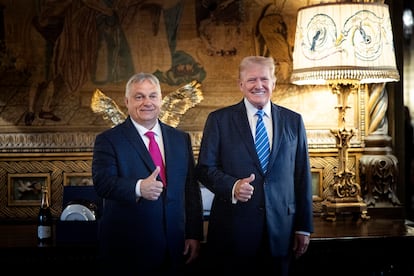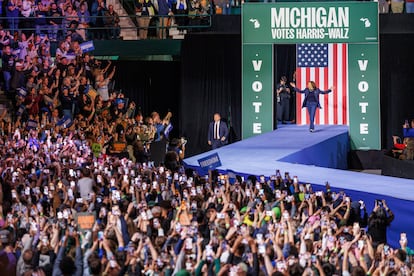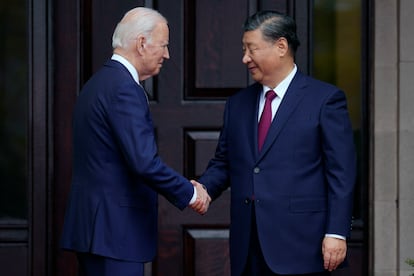World braces for Trump victory with far-reaching consequences
Tuesday’s presidential vote will have a profound impact on Europe, Russia, Ukraine, the Middle East, Latin America, and China
The result of the United States presidential election will have far-reaching consequences beyond its borders. In Russia and Israel, the expectation was a victory for the Republican Party candidate, former president Donald Trump, which would also be welcomed ultra-right governments such as those in Argentina or Hungary. In Brussels and Ukraine, confidence was high that the winner would be the Democratic Party candidate, Vice President Kamala Harris, who would maintain the current relationship with the EU and support for Kyiv in the face of the Russian invasion. In China, officials from the world’s second-largest power are skeptical about the possibility of dialogue with Washington improving substantially over the next four years in either case.
Six EL PAÍS correspondents discuss the effects that the U.S. elections will have on different regions and conflicts around the world.
European Union
By Maria R. Sahuquillo (Brussels)
Europe is holding its breath ahead of the election. The experience of Trump’s first term, his relationship with Russia, and the prospects of what the unpredictable Republican’s return to the White House could mean for the European Union are worrying most member states, and Brussels has prepared contingency plans to prevent and respond to a possible blow. The uncertainty about Tuesday’s polls came at a time when the leaders of the two largest economies in the EU, Germany and France, are very weakened. Chancellor Olaf Scholz and President Emmanuel Macron are leaders with waning influence and at the head of divided governments. And their political survival is not guaranteed. The result in the United States will also deeply mark the European agenda in security, defense, and trade. The challenges arising from a Trump victory would be the primary focus of the summit that European leaders will hold on Thursday and Friday in Budapest.
A Harris presidency would mean maintaining the current status quo with the EU, but if Trump wins, the member states expect a hardening of the trade war between Washington and Beijing — which will also affect the EU — and an even more protectionist escalation with Europe with the imposition of new tariffs. Brussels and several European capitals also fear that a second term for the Republican would leave the EU alone in its support for Ukraine and force Kyiv into an unfavorable and insecure agreement to end the war.
Trump is expected to shift the focus from Europe and support for Ukraine to the Indo-Pacific region. And that would also have effects on the Old Continent, which is extremely dependent on Washington’s support for its security. Trump has attacked NATO and those who do not invest 2% of their GDP on defense spending, such as Spain and Italy. If he maintains this tone, he could weaken the Atlantic Alliance and “embolden” Vladimir Putin, warns a senior European source. Trump’s return to the White House would be welcomed by and would encourage European ultra-right parties and leaders, such as Hungary’s Viktor Orbán or Slovakia’s Robert Fico.

Russia and Ukraine
By Cristian Segura (Kyiv) and Javier G. Cuesta (Moscow)
Ukraine’s future is also being played out in the United States. Without its biggest military ally, as Ukrainian President Volodymyr Zelenskiy has repeatedly said, the war against Russia is lost. For the Kremlin, Trump is the winning horse. His possible victory is viewed with great concern in Kyiv due to his constant messages about turning off the tap on military aid. Trump insists that his priority will be to force Ukraine and Russia to negotiate. Harris, on the other hand, has defended continuing the multibillion-dollar aid to Kyiv on the grounds that the world cannot afford a Putin victory.
The Russian autocrat likes to play a misleading game to confuse his rivals. He said he would never invade Ukraine and then repeatedly stated that he preferred the Democratic candidate in office, stating President Joe Biden was “more predictable.” However, after he dropped out of the race for re-election, Putin said Harris had become his favorite.
The reality is different. In 2018, an escort, Nastia Ribka, mistakenly spread on Instagram conversations held on a yacht between Paul Manafort, Trump’s former campaign manager, the late Russian deputy prime minister Sergei Prikhodko, and the oligarch Oleg Deripaska. The ties were never broken: the renowned journalist Bob Woodward wrote in October that Trump has remained in contact with Putin after leaving the presidency.
The Kremlin also has the unconditional support of Elon Musk, whose social network X is key to spreading Trump-Moscow lies. The businessman, the biggest donor to Trump’s campaign, is a modern-day Charles Lindbergh: he is now a leader in human progress — Lindbergh was the first person to fly across the Atlantic — and an ardent defender of the enemy; Lindbergh had contacts with Adolf Hitler. The Wall Street Journal has revealed that Musk and Putin have also held secret talks. The Kremlin denies this, just as it remained silent on reports that its troops are using Musk’s Starlink satellite network on Ukrainian soil.
Aware of the possibilities of a new Trump mandate, Zelenskiy has insisted over the last month that what Trump says during the election campaign is one thing, and what he might decide to do if he is elected president is another. But equally relevant for Kyiv is the outcome of the vote for the U.S. Congress, where Republicans have for the past two years slowed down the military appropriations that the White House wanted to transfer to the Armed Forces of Ukraine.
The shortage and delays in aid to Ukraine have strengthened Putin, emboldened by his advances in the east of the invaded country in recent months despite his failure to recover the occupied territory in the Russian province of Kursk. The Kremlin says it is willing to negotiate with Kyiv, but only if it first withdraws its troops from the front and renounces a possible accession to NATO, which would leave the country defenseless in the future.

Middle East
By Luis de Vega (Jerusalem)
The United States is Israel’s main ally and its main supporter in the war in the Middle East. That is not expected to change regardless of who wins the election. It is possible, however, that if there is turbulence during the transition period between the Biden administration and the incoming one, the White House will not be as attentive to this region because of domestic issues, argues analyst Amos Harel in the daily Haaretz. Jewish and Arab voters in the United States will go to the polls in the shadow of the Middle East conflict, which could play a decisive role in some swing states such as Michigan and Pennsylvania, given how tight the race is.
Trump has made it no secret that, if he wins, one of his goals will be for Israel to prevail as quickly as possible. But if anything has been demonstrated since the war broke out on October 7, 2023 in the wake of the Hamas massacre, despite the ups and downs and differences with Washington, it is that the line of no return has never been crossed in bilateral relations. U.S. arms shipments for the war operations that have already left more than 43,000 people dead in Gaza have not stopped. Nor has the United States stopped backing Israeli Prime Minister Benjamin Netanyahu at the United Nations.
Lebanon is the other major front, while tensions remain with Iran. Both conflicts are being closely followed by the White House, without turning its back on its ally. In Israel, unlike Europe, Trump has more support than Harris. The Republican’s decision to move the U.S. Embassy from Tel Aviv to Jerusalem, the unrecognized capital of the Jewish state, during his presidential term was a strong endorsement of Israeli policy.

Latin America
By Francesco Manetto (Mexico)
Everything that is decided in the White House or in the United States Congress has a daily impact along the more than 10,000 kilometers (6,213 miles) that separate Patagonia and the Rio Grande. In Latin America, dependence on Washington determines, to a greater or lesser extent, political balances at a local level. From the trade agenda to migration, including security or the scope of diplomatic relations, one administration or another can make the difference for many governments in the region. With these premises, Latin Americans, even the most skeptical, await Tuesday’s elections with the expectation of an event in which their own future is also at stake.
The most affected country is Mexico, where ties with Washington are vital for economic stability. The new president, Claudia Sheinbaum, a left-wing environmental scientist, has avoided commenting on the elections and has said that her priority will be to get along with both Harris and Trump, who during his term threatened former Mexican president Andrés Manuel López Obrador with a tariff war if he did not collaborate with his immigration plan. This is one of the most problematic knots in the bilateral relationship, which has been compounded by concerns about the security crisis and calls to attention from the White House regarding the recent judicial reform, which introduced the popular election of judges.
In South America, Venezuelans face Tuesday with polar opposite feelings. The majority of the opposition, deactivated and cornered by Nicolás Maduro after the July elections, is confident that the next U.S. administration will toughen its position against the Chavista government, which everyone in Washington has already accused of fraud. Hugo Chávez’s successor, like his entourage and supporters, knows that the relationship will be difficult no matter who wins, although Maduro will try to maintain the few commercial links that remain, perhaps through some attempt at dialogue with the opposition, so that the ailing Venezuelan oil industry is not completely dismantled.
There are few expectations for change in Cuba, too. However, any gesture from the White House could prove decisive in alleviating the deep crisis that the island is suffering and an unprecedented exodus. The U.S. election will also have a great impact on countries such as Brazil or Colombia, governed by left-wing presidents. A victory for Harris would mean continuity, while the return of Trump would open the door, especially in the case of Colombia, to open confrontation. The opposite of what the far-right Javier Milei aspires to. The Argentine president is not only a great admirer of Trump, but would seek the support of the magnate in negotiations with the International Monetary Fund.
China
By Guillermo Abril (Beijing)
The technological, commercial, and military race between the United States and China, the world’s first and second powers, will probably be the geopolitical struggle that will mark this century. From this perspective, Beijing is observing the elections with both utmost attention and large doses of skepticism, without showing preference for any candidate, and calculating scenarios depending on who wins. If you ask officials from the Asian giant which of the two candidates they prefer, there is a high probability that the answer will be: “Neither.”
After a Trump presidency followed by the Biden administration, the communist leadership has assumed that there is no magic president who will put an end to the differences between the two countries. The deterioration in bilateral relations began to become apparent under the former, who came to power with a string of invectives against China and unleashed a trade war in 2018. Ties entered a downward spiral, became entrenched during the pandemic, and hit rock bottom with Biden in the White House.
Since Harris became vice president, there have been clashes over Taiwan and China’s ambiguous stance on Russia’s invasion of Ukraine; Washington has also restricted China’s access to the most advanced chips to prevent their use in the military domain, something that Beijing takes as a measure aimed at slowing its development. The symbol of diplomacy in tatters was the shooting down, in February 2023, of a Chinese stratospheric balloon that was flying over U.S. territory without permission. Since then, Biden and his Chinese counterpart, Xi Jinping, have tried to stabilize the situation. In part they have succeeded: military commanders have reopened a channel of dialogue. In part not: barring a surprise, Biden will be the only American president who has not visited China since Jimmy Carter (1977-81).

During the campaign, China has been attacked from both sides. Trump and Harris both accuse each other of having been too lenient with China. The former president has promised a new round of 60% tariffs on all Chinese products. Harris accuses Trump of unleashing the trade war and having ended up selling American chips to China to help it modernize its military.
In Beijing, there are no illusions about either candidate. “While there may be differences in Trump and Harris’s approaches to China, pressure and attacks will continue regardless of who wins,” Wang Yiwei, director of the Center for European Studies at Renmin University of China, and Tan Yannan, a PhD candidate at the same university’s School of International Studies, wrote in a recent article. With Trump, they see a growing economic slowdown; with Harris, technology as a key area for potential conflict.
Sign up for our weekly newsletter to get more English-language news coverage from EL PAÍS USA Edition
Tu suscripción se está usando en otro dispositivo
¿Quieres añadir otro usuario a tu suscripción?
Si continúas leyendo en este dispositivo, no se podrá leer en el otro.
FlechaTu suscripción se está usando en otro dispositivo y solo puedes acceder a EL PAÍS desde un dispositivo a la vez.
Si quieres compartir tu cuenta, cambia tu suscripción a la modalidad Premium, así podrás añadir otro usuario. Cada uno accederá con su propia cuenta de email, lo que os permitirá personalizar vuestra experiencia en EL PAÍS.
¿Tienes una suscripción de empresa? Accede aquí para contratar más cuentas.
En el caso de no saber quién está usando tu cuenta, te recomendamos cambiar tu contraseña aquí.
Si decides continuar compartiendo tu cuenta, este mensaje se mostrará en tu dispositivo y en el de la otra persona que está usando tu cuenta de forma indefinida, afectando a tu experiencia de lectura. Puedes consultar aquí los términos y condiciones de la suscripción digital.









































